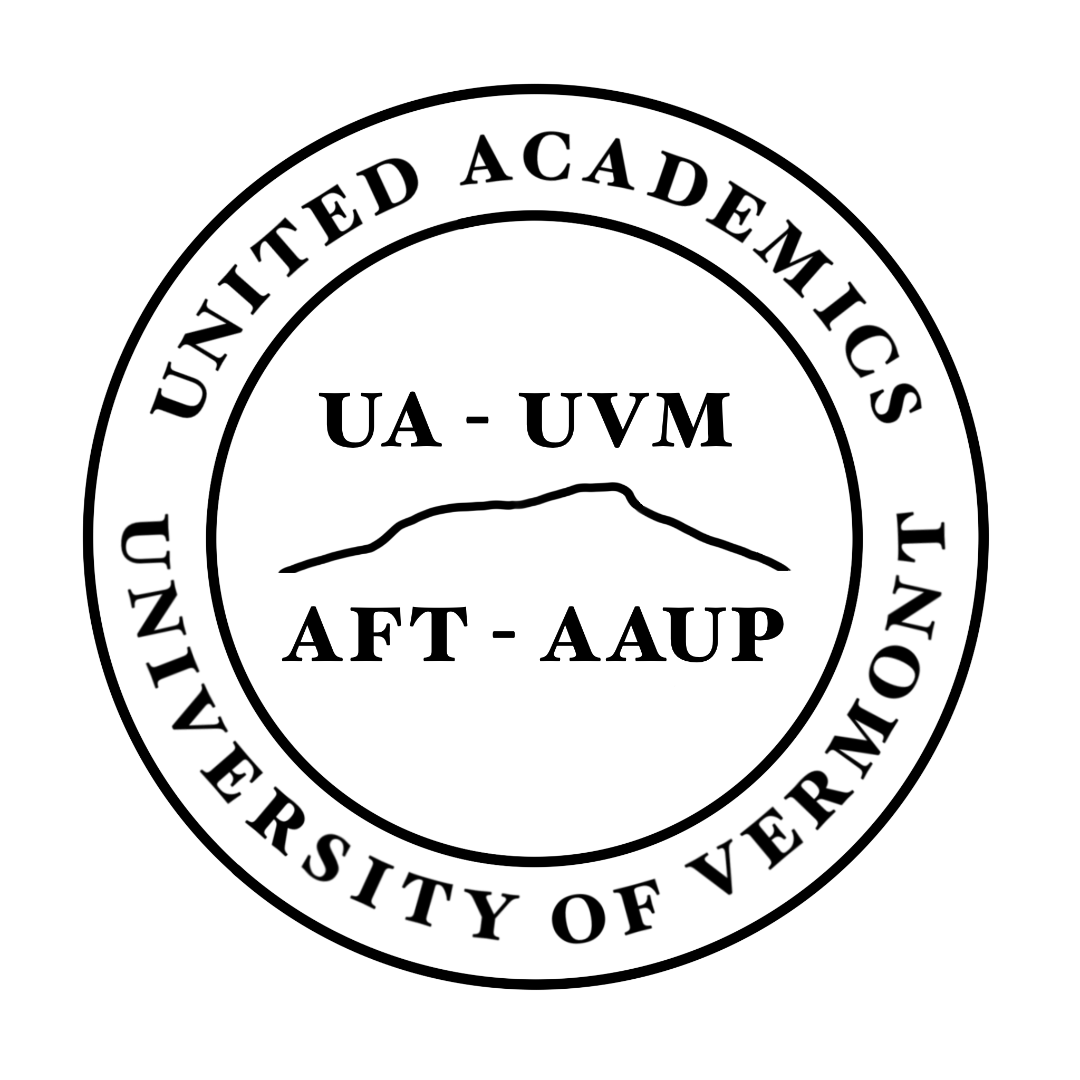Dear UVM Colleagues,
Welcome Spring 2018 semester. I hope you had a great break and that your first week of classes is going smoothly. This month I have 1) another invitation, 2) a call to participate in the IBB 2.0 process, and 3) some thoughts about budgets.
First, we still want to hear from you. If you have questions, concerns, or complaints, feel free to send me an email. Even better, join United Academics Delegates and Department Representatives for coffee or lunch: for Coffee and bagels, Wednesday 1/24, 9-11am: Drop-in anytime at Old Mill, GSWS Conference Room on the ground floor. Or pick up some Lunch, Friday 1/26, 12-2pm: Drop-in anytime, in Waterman 427A. These will be informal gatherings, with a chance to talk with department delegates, ask any questions about the contract process, and enjoy lunch or coffee! Come by in any case, but if you can, an RSVP to long time DA member, part time lecturer and VT AFT staffer Katlyn.Morris@aftvermont.org would be appreciated.
Second, you most likely received an invitation from the Provost’s Office to participate in a survey regarding the IBB model, intended to be used for the next version of IBB. UA has had no input into this survey, but please respond. The survey, due this Friday Jan. 19th, is here: https://survey.uvm.edu/index.php/573865?lang=en
If you are like me, you hate surveys and generally assume they are a waste of time. But this might be a different case. There are people involved in the process in the Faculty Senate and elsewhere who would like to use these responses to pursue real reform. The survey is not designed to be quick or easy – it feels a bit hostile, actually – and it demands concrete examples, real evidence of claims, not generalized impressions. And it is not anonymous. (If you feel responding might make you vulnerable, then that’s a reason not to respond.) But, precisely because response rates will no doubt be low, your voice will likely matter more, particularly if you offer details about issues you may have with IBB, about its consequences and effects.
Sometimes faculty governance is hard work, and often it proceeds through less-than-perfect means. But sitting back and kvetching gets old after a while. Give speaking up a try.
Third, about budgets. Please plan to come if you can to our “Open the Books at UVM” event on Feb. 1 at 4:30 in Waterman in 413.
As we prepare for that event (and for fact-finding), I often get conflicting advice about what to emphasize. Some tell me UA should be more emphatic in criticizing high administrative salaries and lavish spending on non-academic things like marketing. Others tell me we should do less of that, because administrators are not evil people and most of what they do is reasonable given the constraints they work under. After giving it some thought, I think part of the issue is about whether one is talking about the forest or the trees, about long-term national trends or more immediate local issues.
On the local level (the trees): We don’t think administrators are evil. UA leadership has included folks who have been or have gone on to be provost, vice provost, associate deans, and more. But more to the point, specific policies at UVM, like non-academic spending trends, are experienced by administrators as normal and perhaps necessary to maintain competitiveness. When the UVM administration notes that they are “within norms” in terms of administrative spending – which they are likely to do when they present matters to the fact finder – they will not be lying. Administrative salaries here are not dramatically different from most public universities around the country. Last year’s study of UVM’s finances commissioned by UA found that UVM recently spent about three percent more than its self-identified peers on non-academic matters – which amounts to $12 million – but that does not make us an outlier nationally, and that particular number could change. Our negotiating team understands those local complexities, and our specific contract proposals, including salaries, take all that into account, often artfully.
On the broad long term level (the forest) the story is different. I was reminded of this when the AAUP (the organization which supports academic freedom and the tenure system at all universities in the U.S.), recently filed an amicus brief with the US Court of Appeals for the DC Circuit regarding a case about faculty bargaining rights. The brief noted that,
between 1976 and 2015, the number of full-time executives and managers in higher education grew by 140 percent, while the number of full-time and tenure-track positions has plummeted, with lower-wage non-tenure track faculty making up 70 percent of all faculty positions. This is nearly the reverse of the proportions in 1969, when 78 percent of faculty positions were tenured and tenure-track. From 1976 to 2011, the number of full-time non-faculty professional positions increased by 366 percent overall, with growth of 558 percent in that category at private institutions.
These are long-term trends, they are nationwide, and they are evident at UVM. The forest is one in which non-academic spending has grown and spending on tenure-track faculty has become an ever-smaller percentage of spending nationwide. That’s a key part of the big picture.
Can United Academics change those long-term trends overnight? No. But the union, as a representative of all faculty, is in a unique position to speak to the big picture while addressing local policies. We are not omniscient, but by bringing together the experiences and insights of faculty, large numbers of whom have been contributing to UVM for decades, we can contribute to the governance of UVM while taking account of long-term trends, of the big picture. And I for one think UA's contribution has made and will continue to make UVM a better university.
Good luck with your semester, and keep warm.
Best,
Tom Streeter
President, United Academics
thomas.streeter@uvm.edu
